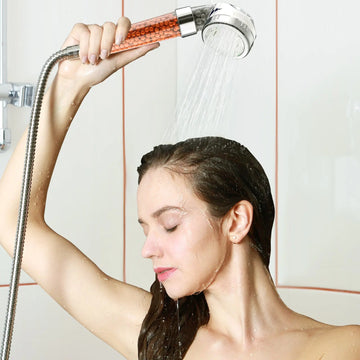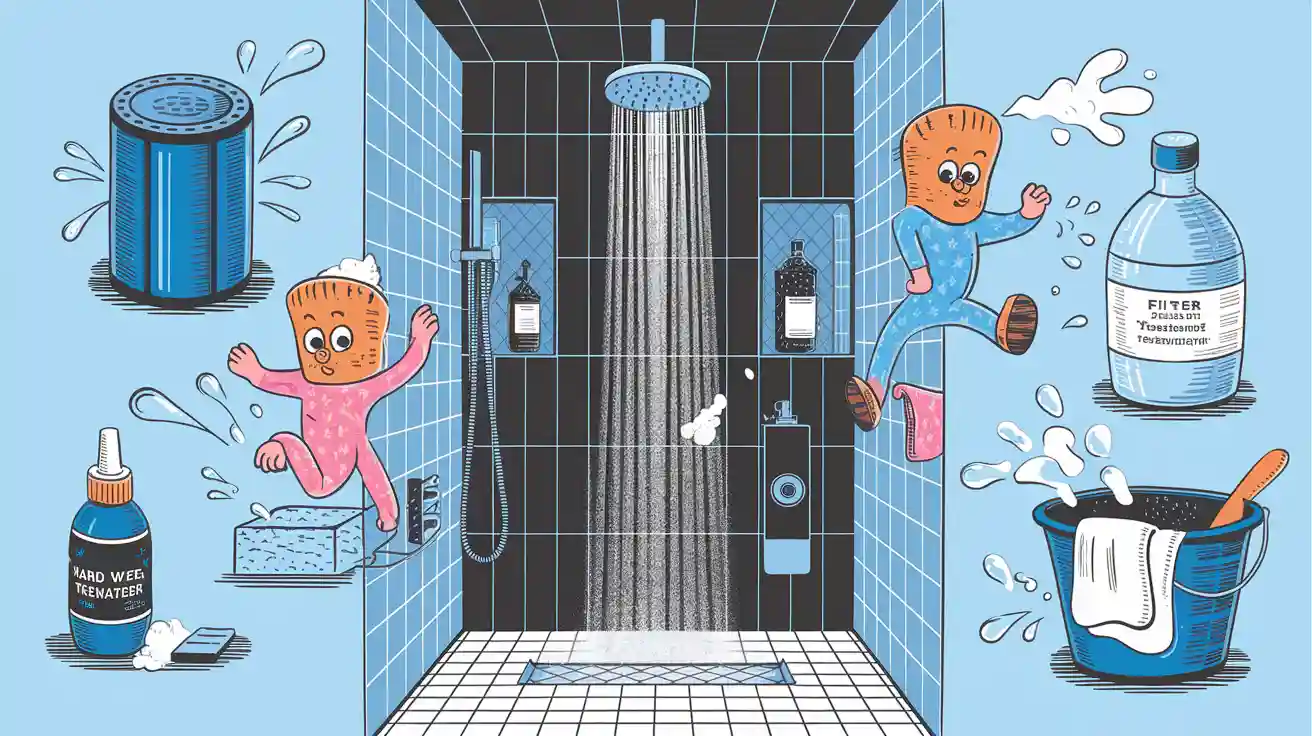
You have many choices to fix hard water besides a water softener shower head. These choices are a whole house water softener, filtered shower heads, point-of-use filters, electronic descalers, powered anode rods, and easy home remedies. About 85% of homes in the United States have hard water. Hard water can make limescale and cause problems for appliances. Many people want something else because a softener shower head only works in one place. It also needs new filters often or may cost too much. Each choice has its own good points, so you can pick what works best for you.
Key Takeaways
Whole house water softeners clean all the water in your home. They keep pipes and appliances safe. They give long-lasting help with hard water.
Filtered shower heads make shower water better by lowering chlorine and some minerals. This helps your skin and hair feel softer.
Point-of-use filters clean water at certain taps or showers. They are cheap and simple for renters or small needs.
Electronic descalers stop scale from building up without taking out minerals. They use magnetic fields to keep pipes and appliances safe.
DIY remedies like boiling water, vinegar, and laundry boosters are cheap and help for a short time. But they do not fully fix hard water.
Quick Alternatives List
Whole House Water Softener
A whole house water softener cleans all the water in your house. You put this system where water comes into your home. It takes out minerals like calcium and magnesium. These minerals make water hard. Every tap in your house gives you soft water. This is a good choice if you want a fix that lasts a long time. You pay more at first, but your pipes and appliances stay safe.
Tip: If you want soft water everywhere, a whole house water softener is a great choice instead of a water softener shower head.
Filtered Shower Heads
Filtered shower heads have a filter that takes out chlorine, heavy metals, and some minerals. You screw them onto your shower arm. These water softener products make water better for your skin and hair. Some, like the Cobbe DS Filter Shower Head, have strong filters and different spray types. You can put them on fast and do not need tools.
Point-of-Use Filters
Point-of-use filters go on one faucet or shower. You use these water softener products to clean water in just one spot. They help stop hard water problems and take out some bad stuff. This choice costs less than a whole house system. It is good for people who rent their homes.
Electronic Descalers
Electronic descalers use electric signals to change how minerals act in water. They do not take out minerals, but they stop limescale from forming. You put these water softener products on your main water pipe. This fix is easy to take care of and does not need salt.
Powered Anode Rods
Powered anode rods keep your water heater safe from hard water. You put them inside the heater tank. They pull in minerals and help stop scale. This softener alternative helps your water heater last longer.
DIY & Home Remedies
You can use easy home remedies for hard water. Boil water to get rid of some minerals. Use vinegar or baking soda to clean limescale off things. Laundry boosters can make water softer for washing clothes. These ideas are good for a short time if you do not want to buy water softener products right now.
Whole House Water Softener
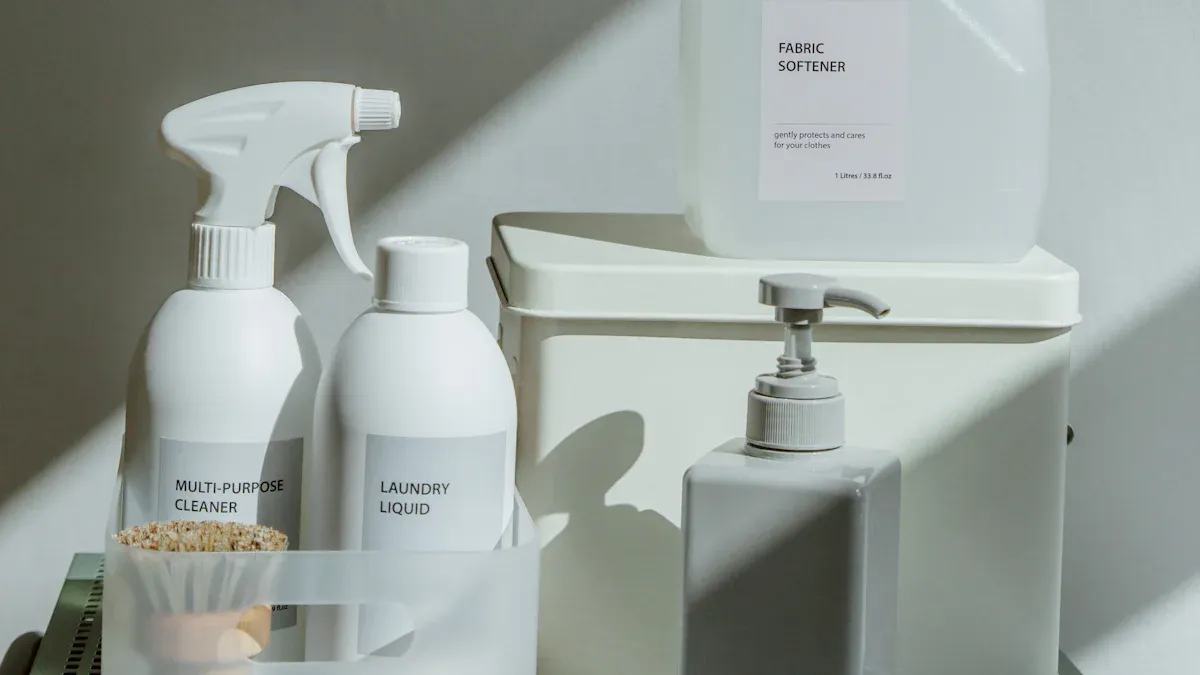
Overview
A whole house water softener gives you a powerful way to fight hard water in every part of your home. You install this system where water enters your house. It treats all the water before it reaches your faucets, showers, and appliances. Most softeners use a process called ion exchange. This process removes hard water minerals like calcium and magnesium. The system swaps these minerals with sodium ions, which do not cause scale or buildup.
Here is how a typical salt-based softener works:
Hard water flows into a tank filled with resin beads.
The resin beads grab onto calcium and magnesium ions.
Sodium ions replace the hard water minerals.
Over time, the resin beads fill up with minerals.
The system flushes the beads with a saltwater solution to clean them.
The cycle repeats, giving you soft water all the time.
Some water softener products use salt-free technology. These systems do not remove minerals. Instead, they change the minerals so they do not stick to pipes or appliances. Salt-free softeners need less care and do not add sodium to your water. They work best if your water is only slightly hard.
Pros & Cons
You get many benefits when you use a whole house softener:
Your skin and hair feel softer and healthier.
Appliances like water heaters and dishwashers last longer.
Pipes stay clear because scale does not build up.
You use less soap and detergent, which saves money.
Dishes and laundry come out cleaner.
There are also some drawbacks to consider:
Salt-based softeners add a small amount of sodium to your water. This may matter if you need a low-sodium diet.
These systems release salt into the environment, which can harm lakes and streams.
You need to refill salt and do regular maintenance.
The upfront cost can be high.
Softeners do not remove bacteria or chemicals. You may need extra filters for safe drinking water.
Note: Salt-free softeners are more affordable to maintain and better for the environment, but they may not work as well if your water is very hard.
Cost
The price of a whole house water softener system depends on your home size and the type of system you choose. Most people in the United States pay between $1,000 and $3,000 for a standard system, including installation. Some systems cost as little as $300 or as much as $7,000. You also need to budget for maintenance.
Here is a table to help you understand the costs:
Cost Component |
Cost Range (USD) |
Typical Cost (USD) |
|---|---|---|
Installation Labor |
$150 - $1,000 |
$500 - $700 |
Additional Plumbing Work |
$200 - $800 |
N/A |
Water Softener System |
$300 - $7,000 |
$1,000 - $3,000 (incl. installation) |
Salt Purchases (monthly) |
$5 - $10 |
N/A |
Filter Replacements |
$20 - $50 each |
N/A |
Resin Tank Cleaning |
$100 - $200 annually |
N/A |
Professional Servicing |
$150 - $300 annually |
N/A |
You will spend money on salt, filter changes, and sometimes professional service. Salt-free softeners cost less to maintain because you do not buy salt.
When to Use
You should choose a whole house softener if you want a long-term solution for hard water. This system works best when:
Your water has a high level of hard water minerals (above 7 grains per gallon).
You see scale buildup on faucets, shower doors, or inside appliances.
You want to protect your water heater, dishwasher, and washing machine.
You want soft water at every tap in your home.
You want to reduce soap scum, spots on dishes, and dry skin.
Salt-based softeners work well for most homes with hard water. Salt-free systems are a good choice if your water is only slightly hard or if you want an affordable, eco-friendly option. Always test your water before you buy a system. A professional test will help you pick the right water softener products for your needs.
Filtered Shower Heads for Hard Water
Overview
Filtered shower heads are an easy way to make your shower water better if you have hard water. You attach them right to your shower arm. They use special filters to catch or change things you do not want in your water. This gives you water that feels nicer on your skin and hair. Most filtered shower heads do not make water soft like a whole-house softener. But they help cut down on hard water spots and make showers feel better.
Here is how a filtered shower head helps with hard water and other things in your water:
Water goes through different layers inside the filter.
Activated carbon takes in chlorine and other stuff, so water smells and tastes better.
KDF uses zinc and copper to get rid of chlorine, heavy metals, and stops bacteria from growing.
Calcium sulfite changes chlorine into safer chloride ions, which are better for your skin.
Vitamin C gets rid of chlorine and chloramines, which helps protect your skin and hair.
All these layers work together to trap or change bad things, so your water feels softer and cleaner.
This helps stop minerals from building up, keeps your skin and hair safe, and makes your shower easier to clean.
Filtered shower heads do not take out all hard water minerals, but they do help with water problems in your shower.
Cobbe DS Filter Shower Head
The Cobbe DS Filter Shower Head is a great pick if you want a better shower. It has a 20-stage filter that takes out over 99% of chlorine and heavy metals. The filter uses KDF-55, calcium sulfite, and mineral balls to clean your water. Your skin and hair feel softer and look better after you shower.
You can pick from five spray types, like rain, massage, mist, water-saving, and power wash. The shower head is made to keep water pressure high, even if your house has low pressure. You can put it on in just a few minutes and do not need any tools. It fits most showers.
Cobbe uses strong ABS plastic that lasts a long time. You can choose from different colors to match your bathroom. The filter lasts longer than many others, so you save money on new filters. Cobbe also gives you a lifetime warranty and free shipping, so this shower head is both trustworthy and a good deal.
Other Brands
There are many other filtered shower heads for hard water. Some popular brands are:
Monsia KLEEN: Has a filter with KDF, activated carbon, and vitamin C. It helps lower chlorine, heavy metals, and some hard water minerals.
AquaBliss SF100: Has a 12-stage filter that works on chlorine, pesticides, and bad smells. It makes water better and helps with dry skin.
Sonaki Inline: Uses vitamin C to get rid of chlorine and chloramines. It is good for people with sensitive skin.
Sprite and Culligan: Have cheaper shower filter heads that use carbon and KDF to lower chlorine and some minerals.
Each brand uses different filter parts and designs. Some focus on taking out chlorine, while others add more layers to catch more things. You should check what kind of filter it uses and how often you need to change it before you buy.
Pros & Cons
You should think about the good and bad sides before picking a filtered shower head or a regular water softener shower head. Here is a quick look:
Aspect |
Filtered Shower Heads |
Traditional Water Softeners |
|---|---|---|
Scope of Treatment |
Point-of-use (single shower head) |
Whole-house (all water entering home) |
Targeted Contaminants |
Chlorine, heavy metals, some minerals |
Primarily calcium and magnesium hardness minerals |
Effectiveness on Hardness |
Less effective at removing calcium and magnesium |
Highly effective via ion exchange |
Installation |
Affordable, easy to install |
Expensive, requires professional installation |
Maintenance |
Frequent cartridge replacements needed |
Ongoing maintenance, salt/potassium refills |
Benefits |
Improves hair and skin health; reduces mineral deposits; improves water smell and taste |
Protects plumbing and appliances; reduces limescale throughout home |
Drawbacks |
Limited mineral removal; shorter filter lifespan; may be more costly over time due to replacements |
Higher upfront cost; requires space; ongoing maintenance costs |
Filtered shower heads are good for your skin and hair. They are cheap and simple to put in. But you may need to change the filter a lot, and they do not take out all hard water minerals. A regular softener gives you soft water everywhere, but it costs more and needs more work.
Note: Some shower heads use ion exchange filters to lower hard water minerals, but you must change them often and they cost more. Vitamin C and activated carbon filters help with chlorine and bad smells, but do not fix mineral buildup.
Cost
Filtered shower heads for hard water come in many prices. Most cost between $30 and $79. New filters cost $8 to $30 each. You usually need to change the filter every 3 to 12 months, depending on your water and how much you shower.
Product Type |
Model/Name |
Price Range (USD) |
Replacement Filter Interval |
|---|---|---|---|
Filtered Shower Heads |
Sprite, Culligan, Cobbe, AquaBliss |
$29.92 - $78.76 |
3 to 12 months |
Replacement Filter Cartridges |
Culligan, Swift, Cobbe |
$8.08 - $29.99 |
3 to 9 months |
Filtered shower heads are a cheap way to make your shower water better. The Cobbe DS Filter Shower Head, for example, keeps filter costs low, so it is a smart pick for families.
When to Use
You should get a filtered shower head if you want better shower water but do not want to put in a whole-house softener. These work best when:
You rent your home or cannot change the pipes.
You want to lower chlorine, heavy metals, and some hard water spots in your shower.
You have skin or hair that gets dry or itchy from harsh water.
You need a cheap, easy fix for water problems.
You want to keep your skin and hair from getting dry or irritated.
Filtered shower heads do not take out all hard water minerals, so you might still see some spots or stains. If you want to fix hard water in your whole house, a whole-house softener is better. For most people, a water-softening shower head makes showers feel nicer and cleaner without spending a lot.
Point-of-Use Filters
Overview
Point-of-use filters help you treat water at specific spots in your home, like your kitchen sink or shower. You install these filters right where you use water the most. This means you can target the places where hard water causes the most trouble. These filters work well for drinking, cooking, or bathing. You do not need to change your whole plumbing system. You get better water quality at the tap you use every day.
Types
You can choose from several types of point-of-use filters. Each type uses a different technology to clean your water. Here is a table to help you compare them:
Filter Type |
Filtration Technology |
Key Features and Pros |
Limitations and Cons |
|---|---|---|---|
Reverse Osmosis (RO) |
Multi-stage filtration with a 0.0001-micron membrane; removes 99.9% of contaminants, including bacteria |
Highest filtration level; removes bacteria and most contaminants; longer lifespan |
Produces wastewater; higher cost |
Carbon Filters |
Adsorption using carbon to trap contaminants like chlorine; micron ratings of 0.5, 5, or 10 microns |
Improves taste and odor; easy to install and maintain |
Does not remove physical particles or bacteria |
Sediment Filters |
Physical screen to remove dirt, debris, and rust; average micron rating around 5 microns |
Removes solid particles; simple installation; often used as a pre-filter |
Does not remove chemicals, heavy metals, or bacteria |
You can pick a filter based on what you want to remove from your water. Some people use more than one type for the best results.
Pros & Cons
Point-of-use filters have many benefits, but you should also know their limits.
Pros:
You install them only where you need better water.
You get high-quality drinking water.
Some models need no tools for setup.
They work well for renters or people who move often.
Cons:
You must replace the filter every few months.
They only treat water at one spot.
You need more than one filter for the whole house.
They do not protect your pipes or appliances from hard water.
Some filters may slow down water flow.
Tip: If you want soft water for your whole home, you need a bigger system. Point-of-use filters work best for single taps or showers.
Cost
You can find point-of-use filters at many price points. Most cost between $20 and $200, depending on the type and brand. Reverse osmosis systems cost more, but they give you the cleanest water. Carbon and sediment filters cost less and are easy to change. You should plan to buy new filters every 3 to 12 months. This keeps your water clean and safe.
When to Use
Choose a point-of-use filter if you want to fix hard water problems at one faucet or shower. These filters work well if you rent your home or do not want to spend a lot. You get soft water for drinking or bathing without changing your whole plumbing. If you only care about water quality at a few spots, this is a smart choice.
Electronic Descalers
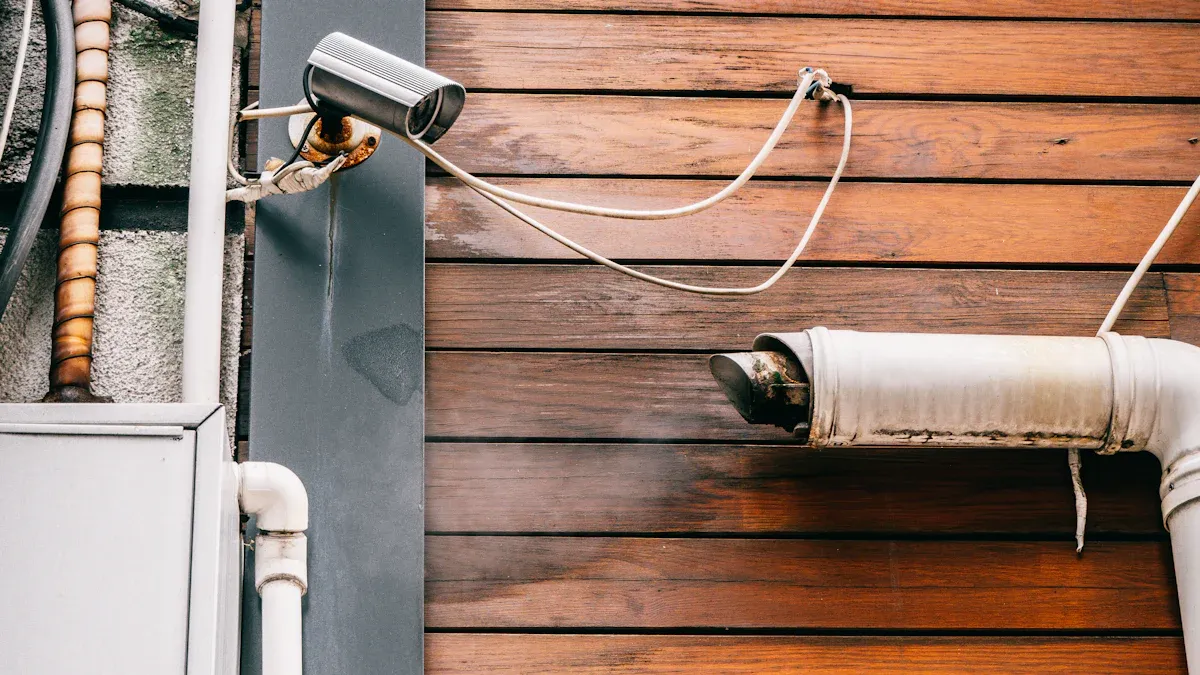
Overview
Electronic descalers are a new way to help with hard water at home. These devices use a magnetic field to change how minerals act in your water. When water goes through the descaler, it changes the shape of calcium carbonate crystals. The crystals become softer and do not stick to pipes or appliances as much. You do not need to use salt or chemicals. This is a physical process, not a chemical one.
The magnetic field turns the mineral structure from aragonite into calcite.
Calcite is softer and can dissolve in water more easily.
This helps water wash away old scale and stops new scale from building up.
Over 25 science studies show electronic descalers can help water flow better and make pipes heat up faster.
Many people see less limescale on their faucets and showerheads after using a descaler.
Pros & Cons
It is important to know the good and bad sides before you pick an electronic descaler as your water softener device.
Advantages:
You do not have to buy salt or filters.
The device does not use electricity or make wastewater.
It is good for the environment and easy to take care of.
Healthy minerals stay in your water.
You can put it in without changing your pipes.
Disadvantages:
The first cost is higher than some other choices.
It works best if your water is not very hard. If your water is very hard (over 15 grains per gallon), it might not work as well as a regular softener.
Feature |
Electronic Descalers |
Traditional Water Softeners |
|---|---|---|
Removes Minerals |
No |
Yes |
Maintenance |
Very Low |
Regular (salt, cleaning) |
Eco-Friendly |
Yes |
No (wastewater, salt use) |
Upfront Cost |
Moderate |
High |
Best for |
Moderate hard water |
Very hard water |
Tip: Electronic descalers are a smart pick if you want a way to handle hard water that is easy and good for the planet.
Cost
You will pay about $182 for a popular model like the iSpring ED2000 Whole House Electronic Water Descaler. Most people can put these devices in by themselves, so you do not pay for someone to install it. You do not need to buy salt or filters, so you save money over time.
When to Use
Electronic descalers are a good choice if you want less limescale in your pipes and appliances. Pick this option if:
You want an easy way to deal with hard water.
You do not want to use salt, chemicals, or change filters often.
You rent your home or want something simple to install.
You want a solution that is good for the environment.
You need a long-lasting fix for water that is not too hard.
If your water is very hard, you might need a stronger system. For most homes, electronic descalers are an easy way to keep your pipes and appliances safe from scale.
Powered Anode Rods
Overview
Powered anode rods help keep your water heater safe from rust. They use electricity to stop rust and mineral buildup inside the tank. Regular anode rods slowly disappear as they work. Powered anode rods do not wear out like that. You plug them in, and they send a small electric current through the water. This current helps protect the tank from damage caused by minerals and bacteria. If you have hard water, regular rods can wear out fast. Powered anode rods last much longer and help your water heater work better.
Feature |
Traditional Anode Rods (Magnesium/Aluminum) |
Powered Anode Rods |
|---|---|---|
Function |
Sacrificially attract corrosive elements via electrolysis to protect tank lining |
Use electrical current to actively prevent corrosion without metal consumption |
Material |
Magnesium or Aluminum |
Electrical device, no sacrificial metal |
Lifespan |
Limited, rods deplete over time, especially in hard water conditions |
Longer lifespan due to no metal depletion |
Maintenance |
Requires periodic replacement due to depletion |
Minimal maintenance required |
Effectiveness in Hard Water |
Aluminum rods preferred for durability but still deplete |
More effective and longer-lasting in hard water |
Impact on Water Quality |
May cause metallic or sulfur smell |
Improved water quality, no metal leaching |
Cost |
Lower initial cost |
Higher initial cost but cost-effective long-term |
Pros & Cons
Powered anode rods give your water heater strong protection. They help stop rust and scale from building up. These rods also help get rid of the rotten egg smell that can come from magnesium rods. You do not need to change them often, so you save time and effort.
Pros:
Give strong, steady protection from rust.
Can last up to 20 years or more.
Help stop limescale and save energy.
Get rid of sulfur smells in hot water.
Work with both city and well water.
Need very little care.
Cons:
Stop working if the power goes out.
Cost more at first than regular rods.
Electrical parts may need to be checked sometimes.
Tip: Powered anode rods are a good idea if you want to avoid changing rods often and want to stop bad smells in your water heater.
Cost
A powered anode rod costs about $159.99. Most people can put one in with simple tools like a wrench and screwdriver. If you do it yourself, you do not pay for someone to install it. These rods can last up to 20 years, so you do not need to buy new ones often. Over time, this makes powered anode rods a smart way to fix hard water problems in your water heater.
When to Use
Pick a powered anode rod if your regular rod wears out fast or if your hot water smells like rotten eggs. These rods are best when you want long-lasting protection and less work. If you use a water softener, powered anode rods help stop extra rust and bad smells. They are also good if you want better water quality and no metal taste. You should think about this upgrade if you want your water heater to last longer and work better, even with hard water.
DIY & Home Remedies
Boiling Water
Boiling water is an easy way to help with hard water at home. When you boil water, some minerals like calcium and magnesium sink to the bottom. This takes away what is called "temporary hardness." After boiling, let the water cool down. Then pour out the clear water and leave the minerals behind. This works best for small amounts, like for drinking or cooking. It does not get rid of all minerals, but it helps if you need a fast fix.
Vinegar & Baking Soda
Vinegar and baking soda are two things you can use to fight hard water. Vinegar is a natural acid that can break up limescale on sinks, showerheads, and tiles. You can soak things in vinegar or spray it on to clean off minerals. Baking soda reacts with calcium and magnesium in hard water. This makes it easier to clean laundry and surfaces. Studies show baking soda can lower magnesium and make water less harsh. These ideas are cheap and easy to find in any store.
Laundry Boosters
Laundry boosters help you get cleaner clothes when you have hard water. Things like washing soda or borax grab onto minerals in the water. This stops the minerals from messing up your soap. You add these boosters to your washing machine with your regular detergent. This makes the water softer for washing and helps your clothes feel softer and look brighter. Laundry boosters are a cheap way to get better laundry without buying new machines.
Pros & Cons
Here is a quick chart to show how these home remedies work compared to other ways:
Remedy |
Effectiveness Rating |
How it Works |
Best Use Case / Notes |
|---|---|---|---|
Boiling Water |
Removes temporary hardness by settling minerals |
Good for small amounts; not for whole-home use |
|
Vinegar & Baking Soda |
7/10 |
Dissolves or reacts with minerals |
Great for cleaning and laundry; easy and budget-friendly |
Laundry Boosters |
7/10 |
Binds minerals in washing machine |
Improves laundry results; affordable and simple |
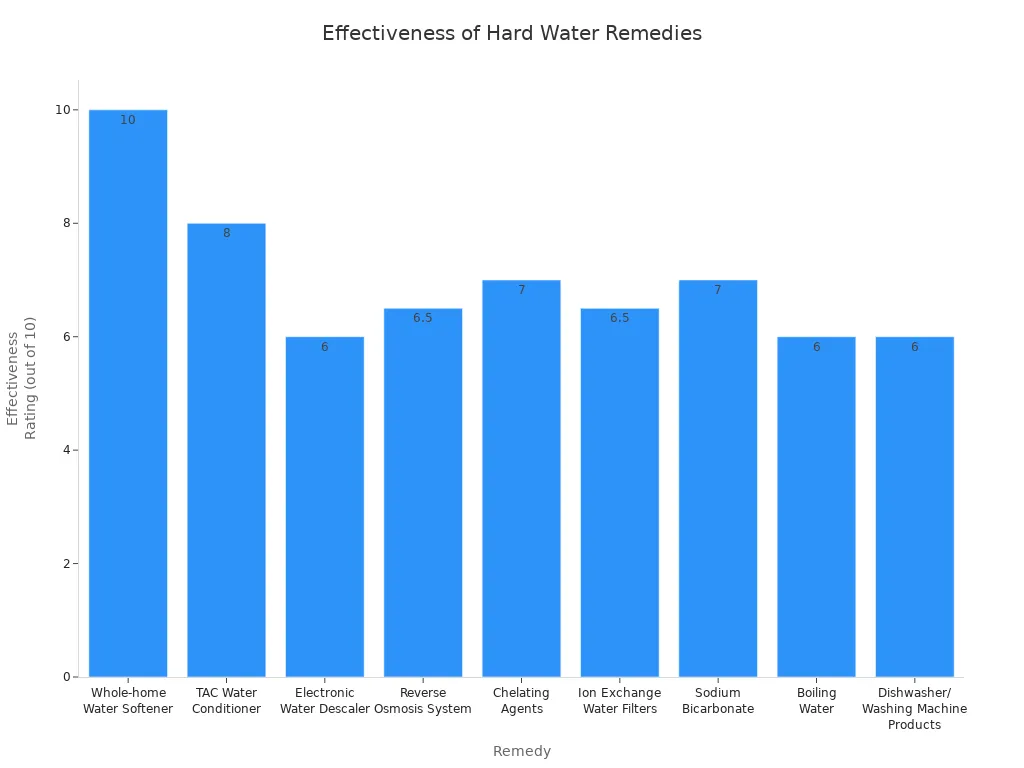
When to Use
Try these DIY and home remedies if you want a cheap, short-term way to help with hard water. They are good if you rent or need to save money. These ideas help with cleaning, laundry, and small water jobs. For a long-term or whole-house fix, you may need something else.
Comparing Alternatives
Effectiveness
You want something that really helps with hard water. Whole house softeners are best for stopping scale and keeping appliances safe. Studies say soft water helps heaters use less energy and last longer. Filtered shower heads and point-of-use filters make water better for skin and hair. But they do not take out all minerals. Electronic descalers change how minerals act, so you see fewer stains on faucets and tiles. DIY remedies help with cleaning, but they do not fix water for the whole house.
Alternative |
Effectiveness for Hard Water |
Best Use Case |
|---|---|---|
Whole House Softener |
⭐⭐⭐⭐⭐ |
Full-home, long-term solution |
Filtered Shower Head |
⭐⭐⭐ |
Showers, skin, and hair |
Point-of-Use Filter |
⭐⭐⭐ |
Drinking, cooking, or bathing |
Electronic Descaler |
⭐⭐⭐ |
Reducing buildup, easy install |
Powered Anode Rod |
⭐⭐⭐ |
Water heater protection |
DIY/Home Remedies |
⭐⭐ |
Cleaning, laundry, short-term fix |
Cost
You should think about both buying and keeping things working. Whole house softeners cost more at first, but save money by stopping damage from hard water. Filtered shower heads and point-of-use filters are cheaper and easy to swap out. Electronic descalers and powered anode rods do not cost much to keep up. DIY fixes are cheap, but you might spend more if you need a fix that lasts.
Tip: New softener systems use less salt and water. This saves money and helps the planet.
Maintenance
Every choice needs some care. Softeners need you to add salt and check them. Filtered shower heads and point-of-use filters need new cartridges every few months. Electronic descalers and powered anode rods need little work after you put them in. DIY fixes mean you have to clean things often. New softener systems make care easier and waste less.
Best for Renters vs. Homeowners
Pick what works for your home. Renters often pick filtered shower heads, point-of-use filters, or electronic descalers. You can put these in and take them out easily. Homeowners can get a whole house softener or a permanent filter for a long-term fix.
User Type |
Best Alternatives |
Why Choose Them? |
|---|---|---|
Renters |
Filtered shower heads, point-of-use filters, electronic descalers |
Easy to put in and take out, low cost |
Homeowners |
Whole house softener, powered anode rods |
Lasts a long time, keeps all pipes and appliances safe |
Note: Always test your water for hardness. If you rent, talk to your landlord before making changes.
You have many ways to handle hard water in your home. Each option fits different needs and budgets. Use this table to compare your choices:
Alternative |
Best For |
Price Range |
Easy to Install? |
|---|---|---|---|
Point-of-Use Filters |
Drinking, cooking |
$30–$200 |
Yes |
Water-Softening Shower Heads |
Skin, hair care |
$25–$70 |
Yes |
Laundry Boosters |
Laundry |
$5–$10 |
Yes |
Pick what matches your living situation. If you want better water for your shower, a filtered shower head works well. For laundry, try boosters. You can always ask a water expert for help. Take the first step to enjoy cleaner water every day.
FAQ
What is the best alternative if you rent your home?
You should try a filtered shower head or a point-of-use filter. These options install easily and do not need changes to your plumbing. You can remove them when you move.
Do electronic descalers remove hard water minerals?
Electronic descalers do not remove minerals. They change how minerals behave in water. This helps stop scale from building up on pipes and appliances.
How often should you replace a shower filter cartridge?
Most shower filter cartridges last 3 to 12 months. You should check the manufacturer's guide. Replace the filter when you notice lower water pressure or a change in water quality.
Can you use vinegar to clean hard water stains?
Yes, you can use vinegar to clean hard water stains. Soak the area with vinegar for a few minutes. Scrub gently with a sponge or brush for best results.
Will a whole house water softener help with dry skin?
A whole house water softener can help with dry skin. It removes minerals that make water harsh. You may notice softer skin and hair after using softened water.
